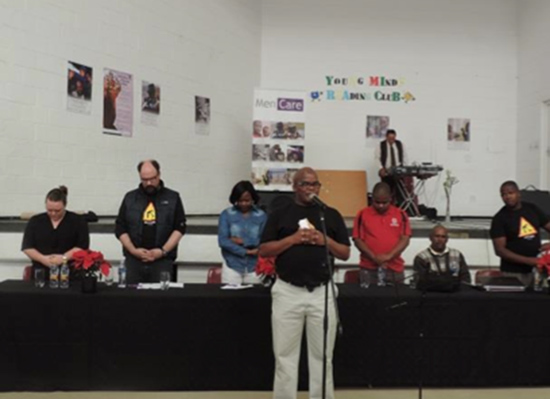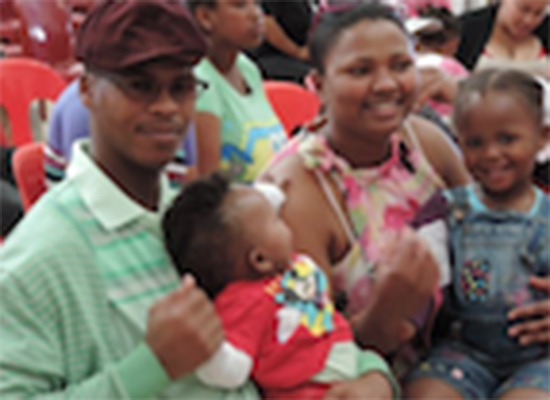 Thursday, 21 November 2013 marked an exciting day for MenCare+, with its official South African launch taking place in Khayelitsha’s Desmond Tutu Hall. People poured into the crowded hall for registration; after which fathers, young people, mothers, children, government personnel as well as partner organisations were seated in anticipation for the day’s proceedings.
Thursday, 21 November 2013 marked an exciting day for MenCare+, with its official South African launch taking place in Khayelitsha’s Desmond Tutu Hall. People poured into the crowded hall for registration; after which fathers, young people, mothers, children, government personnel as well as partner organisations were seated in anticipation for the day’s proceedings.
The event’s programme director Patrick Godana – the MenCare media and government relations manager – asked everyone to stand and observe a minute of silence in memory of the women and children who have died at the hands of men, and to reflect on our role in the upcoming 16 days of activism of no violence toward women and children. Then, mixing humour, grace, light- heartedness and immense warmth as he proceeded to do throughout the day, Patrick welcomed the audience and contextualised the MenCare+ campaign.
Next to speak was Wessel van den Berg, MenCare’s programme manager, who explained the role of the MenCare+ campaign as a response to South Africa’s high number of absent fathers; where two out of every three children do not have the support – financial or emotional – of their father. He emphasizes that the general understandings and norms of childcare exclude the role of the father. Gender equality and bringing the father into the realm of childcare is therefore central to the MenCare+ campaign. Finally, Wessel explained the different levels of MenCare+; namely:
- Individual male counseling in the context of intimate partner violence
- Facilitated young men’s, father’s, and couples’ groups
- Adolescent groups with a focus on sexual and reproductive health and gender equitable relationships and
- Health system strengthening (in collaboration with the Department of Health)
Patrick then took the stand again, explaining that after each speaker, he would be asking questions concerning what audience had just been discussed. Correctly answering these questions would earn a person a MenCare+ t-shirt. This was received very well, and established an air of excitement and dynamism throughout the day’s proceedings.
Next up was Kerryn Rehse – MOSAIC’s operations manager – who spoke about the organisation’s twenty year involvement in the fight against gender- based violence in South Africa. She also explained that all members of a society have a role to play in ending gender-based violence, and that this includes men.Community members were urged to take on the responsibility of becoming active participants in promoting gender equality; a sentiment reiterated once more by Patrick. Proceeding this, Joseph, a father who had recently graduated from one of the SONKE MenCare+’s father groups, then recited a moving rendition of a poem he had written which colourfully captured the work and significance of the fathers’ group in which he had participated. What followed this were three testimonials which proved to be among the most moving segments of the launch. The first was delivered by a mother and father who had been through one of the MenCare+ fathers’ group programmes in Mfuleni. They explained that they had developed an appreciation for one another while in the programme and that their relationship had dramatically strengthened in this way. Following this, a mother and father spoke about how a MenCare+ fathers’ group in Gugulethu allowed them an appreciation of gender equality in rearing their children. Finally, a father from Mitchells Plein, who lives with a disability and uses a wheelchair, delivered a stirring and incredibly personal account of his journey toward becoming an activist and making positive choices in his life.
After a few more t-shirts were handed out, Tracey Naledi, a representative from the Department of Health, touched on the importance of including fathers in childcare, as well as her own experience in speaking with people in regard to this issue. What followed was a brief but powerful account offered by Mr and Mrs Solomons, who had recently been involved in the Male Counselling Toolkit programme offered by Mosaic. Mr. Solomans explained that they had moved from an abusive, despondent relationship to one that was free from violence and characterised by respect and effective communication. This transformation was supported by Mrs Solomans’ account of the process.
as well as her own experience in speaking with people in regard to this issue. What followed was a brief but powerful account offered by Mr and Mrs Solomons, who had recently been involved in the Male Counselling Toolkit programme offered by Mosaic. Mr. Solomans explained that they had moved from an abusive, despondent relationship to one that was free from violence and characterised by respect and effective communication. This transformation was supported by Mrs Solomans’ account of the process.
Next up was the secretary of the Western Cape chapter of SANAC Men’s Sector, who explained that there are currently 5.26 million people living with HIV. He concluded his address by urging all expecting parents to visit local clinics, and not to rely on a partner’s test as a means of finding out one’s own HIV status. A representative of the South African Police Service then briefly discussed his experience in dealing with gender-based violence, which was followed by a representative from the SANAC Women’s Sector discussing the pressure women in South Africa feel in carrying the burden of care, disease and judgement during pregnancy. She ended by posing a challenge for men to fight HIV and violence toward women.
FamilyA representative from the City of Cape Town expressed the City’s support for the MenCare+ campaign and encouragd the event’s participants to make the decision to be actively involved in the campaign. Vidar Vetterfalk – of the Swedish organisation Men for Gender Equality – then spoke about how gender norms in Sweden have changed since the fight for gender equality began in the 1970s and that the goals of MenCare+ are both realistic and achievable. The day closed with MenCare trainer Thulani Velebayi thanking Mosaic, Sonke and everyone in attendance for making the launch such a success. A few more t-shirts were then given out with Patrick’s reiteration that each individual has the responsibility of educating others in the fight for gender equality.
After the speakers had finished, everyone in attendance was treated to a nutritious lunch, over which people were able to discuss what had taken place and how individuals are able to situate themselves within the broader aims of the MenCare+ campaign, which seems destined to be a crucial component in the fight for gender equality in South Africa.